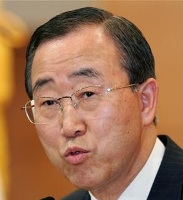UN chief paints grim picture for Darfur crisis and troops deployment
Februay 20, 2008 (UNITED NATIONS) — Secretary-General Ban Ki-moon urged the Sudanese government and all rebel groups on Wednesday to agree to a cease-fire in Darfur, saying deteriorating security is undermining efforts to help thousands of civilians caught in an upsurge in fighting.

The secretary-general painted a grim picture of a worsening conflict seven weeks after a joint African Union-United Nations force took over peacekeeping duties in Darfur from a beleaguered 7,000-strong AU force, and a year after the U.N. and AU launched a new effort to get a political settlement.
Sudan’s Arab-dominated government has been accused of unleashing the janjaweed militia of Arab nomads to commit atrocities against Darfur’s ethnic African communities in the fight with rebel groups. At least 200,000 people have been killed and 2.2 million displaced since the fighting began five years ago.
The AU-U.N. force is authorized to have 26,000 troops and police, but Ban said only about 7,500 military personnel and 1,500 police officers were in Darfur on Jan. 31. He appealed to all countries that have pledged troops to expedite their deployment.
At Sudan’s insistence, the U.N. Security Council agreed that the force would be predominantly African. But the Sudanese government has refused to approve non-African units from Thailand, Nepal and Nordic countries, which withdrew their offer.
Ban said he discussed “the critical issue of the composition of the force” with Sudan’s President Omar Al-Bashir on the sidelines of the African Union summit in Addis Ababa, Ethiopia, on Jan. 31 and “the president’s response was not definitive.” He said the speed of the AU-U.N. force’s deployment “depends critically on this issue being resolved as soon as possible.”
Undersecretary-General for Peacekeeping Jean-Marie Guehenno, who visited the region from Jan. 21-29, “confirmed the tremendous challenges that the mission faces in providing even a modest level of protection to civilians in Darfur,” Ban said, citing the slow deployment of the force.
Ban said he remains “extremely concerned” by recent hostilities between the government and Justice and Equality Movement rebels led by Khalil Ibrahim in West Darfur, and the build-up of their forces in the area, bordering Chad.
This has “severely undermined” humanitarian conditions and access to civilians, he said.
Ban condemned “in the strongest possible terms” attacks on civilians in three towns in West Darfur on Feb. 8 that caused an estimated 200 casualties and forced over 10,000 civilians to flee across the border to Chad. He also accused Chadian regular forces and JEM rebels of launching several attacks inside Sudanese territory, which raised tensions and led to a significant deterioration in security.
“In the light of the security conditions on the ground, the most urgent priority in Darfur is the establishment of a cessation of hostilities,” Ban said.
“To this end, I urge the government and all parties to cooperate fully with the efforts of the special envoys to convene negotiations as soon as possible,” he said. “I reiterate my call on all parties to refrain from the use of force and to come to the negotiating table.”
The secretary-general also stressed that normalizing the deteriorating relations between Chad and Sudan “is essential to the success of the peace process in Darfur and to the long-term prospect for peace in both countries.”
(AP)
